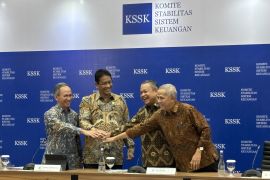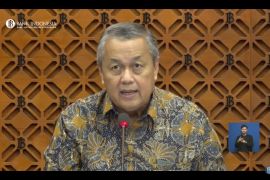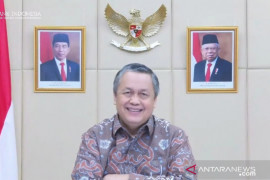The central bank`s governor, Darmin Nasution, said here on Wednesday it decided to keep the rate at 6.5 percent because the high inflation pressure in 2010 was caused more by the hike in the prices of staples and administered price hike by the government.
"The high inflation pressure happens because of the hike in the prices of food particularly rice and therefore it is not a monetary phenomenon and need not be responded to with a change in the monetary policy," he said.
Darmin said Bank Indonesia had been closely monitoring inflation that tended to rise in the future in line with some disruptions in supply of basic necessaries and the possibility of price adjustment by the government.
He said BI viewed that the rise in the expectations of inflation could be minimized through increasing the effectiveness of production, distribution and supply of basic necessaries at national as well as regional levels.
The bank`s board of governors viewed the high inflation in 2010 was caused more by the rise in the price of food as seen from the inflation index on consumer goods prices which reached 0.92 percent month-to-month in December 2010 or 6.96 percent year-on-year.
The high inflation was caused by the high inflation in the food group reaching 17.74 percent year-on-year due to disruptions in the production and distribution resulting from weather anomalies.
Inflation of the administered price group was moderate at 5.40 percent while the core inflation was controlled at 4.28 percent.
"The development of core inflation has been maintained driven by stronger exchange rate of the rupiah, controlled inflation expectations and economic capacity which has so far been able to meet the increasing demand," he said.
Darmin said other risk besides inflation was capital inflow which remained strong in the midst of quite large excess of liquidity.
"In connection with it BI would continue to strengthen the policy of implementing monetary policy combined with macro-economic prudence," he said.
The moves, he said, should also be supported with increased policy coordination with the government to strengthen response to the supply issue in view of the increasing economic activities in the future so that they would not cause inflation pressure.
In that context he said cooperation with the government through the inflation control team at national and regional levels need to be continuously strengthened through focussing the programs on increasing supply and improvement of distribution in particular.
"BI hopes and believes the government will be able to handle this well and bring the inflation rate to meet the target of 4 to six percent in 2011 and 3.5 t0 5.5 percent in 2012," he said.(*)
Editor: Heru Purwanto
Copyright © ANTARA 2011






